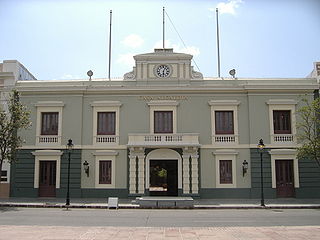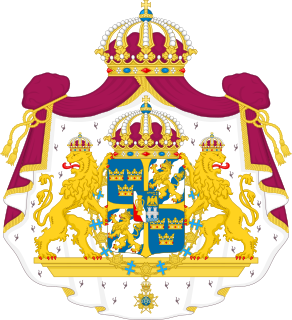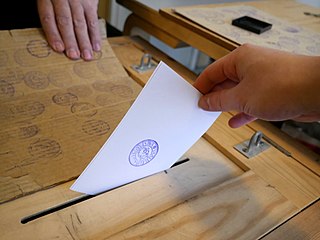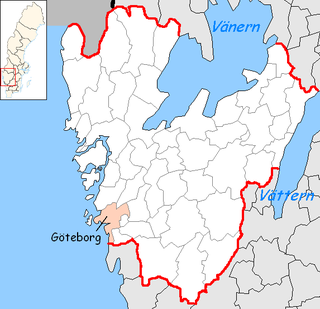
A borough is an administrative division in various English-speaking countries. In principle, the term borough designates a self-governing walled town, although in practice, official use of the term varies widely.

A municipality is usually a single administrative division having corporate status and powers of self-government or jurisdiction as granted by national and regional laws to which it is subordinate. It is to be distinguished (usually) from the county, which may encompass rural territory or numerous small communities such as towns, villages and hamlets.

In many countries, a mayor is the highest-ranking official in a municipal government such as that of a city or a town.

Umeå Municipality is a municipality in Västerbotten County in northern Sweden. Its seat is Umeå, which is also the county seat of Västerbotten County.

The municipalities of Sweden are its lower-level local government entities. There are 290 municipalities which are responsible for a large proportion of local services, including schools, emergency services and physical planning.
The municipalities represent the local level of administration in Finland and act as the fundamental, self-governing administrative units of the country. The entire country is incorporated into municipalities and legally, all municipalities are equal, although certain municipalities are called cities or towns. Municipalities have the right to levy a flat percentual income tax, which is between 16 and 22 percent, and they provide two thirds of public services. Municipalities control many community services, such as schools, health care and the water supply, and local streets. They do not maintain highways, set laws or keep police forces, which are responsibilities of the central government.

A municipality is a local government unit (LGU) in the Philippines. A municipality is often called a town, its archaic term, since municipalities have had the functions of a town since their inception. They are distinct from cities, which are a different category of local government unit. Provinces of the Philippines are divided into cities and municipalities, which in turn, are divided into barangays, formerly barrios. As of September 7, 2019, there are 1,488 municipalities across the country.
A councillor is a member of a local government council in some countries, e.g. England. In Finland it is a title of honour granted by the government to several categories of Finns.
An alderman is a member of a municipal assembly or council in many jurisdictions founded upon English law. The term may be titular, denoting a high-ranking member of a borough or county council, a council member chosen by the elected members themselves rather than by popular vote, or a council member elected by voters.

There are four types of elections in Finland. Each Finnish citizen at least 18 years of age has the right to vote in each of the elections, which decide the following: the president, the parliament, the MEPs, and the municipal and city councils.
Köping was a Swedish denomination for a market town since the Middle Ages. This term was abolished with the municipal reform of 1971, when Sweden was subdivided into the Municipalities of Sweden.
A town council, village council or rural council is a form of local government for small municipalities.

The mayor of Toronto is the chief executive officer of Toronto's municipal government and the head of its city council. The mayor is elected alongside city council every four years on the fourth Monday of October; there are no term limits. While in office, mayors are styled His/Her Worship.

Gothenburg Municipality is a municipality in Västra Götaland County in western Sweden. Its seat is located in the city of Gothenburg.
A township, in the context of New Jersey local government, refers to one of five types and one of eleven forms of municipal government. As a political entity, a township in New Jersey is a full-fledged municipality, on par with any town, city, borough, or village. They collect property taxes and provide services such as maintaining roads, garbage collection, water, sewer, schools, police and fire protection. The Township form of local government is used by 27% of New Jersey municipalities; however, slightly over 50% of the state's population resides within them.

Burgomaster is the English form of various terms in or derived from Germanic languages for the chief magistrate or executive of a city or town. The name in English was derived from the Dutch burgemeester. In some cases, Burgomaster was the title of the head of state and head of government of a sovereign city-state, sometimes combined with other titles, such as Hamburg's First Mayor and President of the Senate). Contemporary titles are commonly translated into English as mayor.
The Faulkner Act, or Optional Municipal Charter Law, provides for New Jersey municipalities to adopt a "small municipality" form of government. Unlike the other Faulkner Act forms of municipal government, the small municipality plan is available only to municipalities with a population of under 12,000.

A municipal council is the decision-making body governing each of the 290 municipalities of Sweden. Though the Swedish Local Government Act uses the term "municipal assembly" in an English translation of the Act, "municipal council" and even "city council" are used as well, even in official contexts in English by several of Sweden's largest municipalities, including Stockholm, Malmö, and Gothenburg.
The college van burgemeester en wethouders is the executive board of a municipality in the Netherlands. This local government body plays a central role in municipal politics in the Netherlands. It consists of the mayor (burgemeester) and the members of the municipal executive (wethouders). Belgium has a similar system, which is referred to as the college van burgemeester en schepenen in the Dutch language.
Local government in New Jersey is composed of counties and municipalities. Local jurisdictions in New Jersey differ from those in some other states because every square foot of the state is part of exactly one municipality; each of the 565 municipalities is in exactly one county; and each of the 21 counties has more than one municipality. New Jersey has no independent cities, or consolidated city-counties.